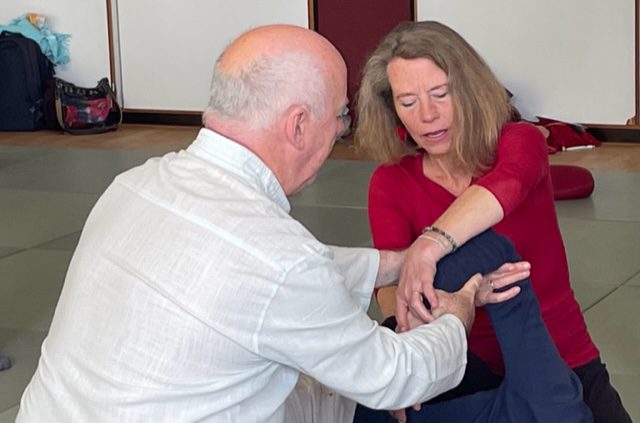BILL PALMER AND TERESA HADLAND IN NOVEMBER 2025

14 – 16 November 2025 in Wageningen
WORKING WITH THE STAGES OF LIFE
“I’m not what happened te me, I am what I choose to become” Carl Jung
The November weekend with Bill Palmer and Teresa Hadland focuses on mature human development. You don’t need to be “old” to join, this weekend is for all bodywork practitioners who are interested in distilling wisdom from life experience and helping others do the same.
We refer to the early stages of human development as innate development. A child becomes a youngster, a youngster an adolescent, an adolescent an adult; this transformation happens naturally, without deliberate intention. The main challenge in these stages is that development can become blocked, and therapy or practice then focuses on unblocking these natural processes.
The later stages of life —the more mature stages— present challenges that can stimulate the growth of higher capacities. Unlike earlier stages, these developments don’t happen automatically; they require intention, practice, and exploration. Therapy at this stage focuses on how to experiment, reflect, and engage in practices that nurture these higher capacities. Problems in this phase of life can often be reframed as opportunities for learning, with therapy offering support in that learning process.
DEEPEN YOUR SKILLS AND SUPPORT YOUR SELF-DEVELOPMENT
This weekend is open for everyone with experience with shiatsu or other form of bodywork. In addition to Movement Shiatsu and Inner Qi Gong, Bill and Teresa will incorporate drama, voice work, movement, and bodywork to explore the evolving capacities of the maturing practitioner, such as mentorship, active listening, non-judgmental presence, and holding space. They will demonstrate how to develop a personal practice that both deepens your therapeutic skills and supports your own inner development. This work nourishes your personal journey and improves your ability to support clients, particularly those facing chronic conditions.
AT EASE WITH YOUR (MATURING) BODY
Our culture tends to see ageing as deterioration and many clients are intolerant of the parts of their body that no longer work so well. This puts those parts under more stress. One of the themes of this workshop is how you help clients integrate those parts, learning to move in ways that take care and learning to cultivate the advantages of maturity rather than trying to hold on to youth.
This also applies to ourselves as therapists. Let’s be honest: as we age, our bodies may start to voice complaints. Many shiatsu and bodywork practitioners find that working on the floor is no longer comfortable. In these cases, a massage table can provide a very welcome alternative.
Throughout the weekend, we’ll make sure to accommodate all bodies; whether older or younger, tired or energetic. You’ll have the option to work on a massage table, sit on a regular chair, or choose whatever setup feels best for you. We’ll arrange the space to accommodate everyone’s preferences. So don’t let physical limitations hold you back, there’s no need to spend three days sitting or working on the floor if that’s not comfortable for you.
ACCREDITATIONS
Accreditation will be requested from KTNO (among others NVST) and ZHONG (category 1 and/or 3). LVNT and SVN automatically recognize our training courses.
THE TEACHERS
BILL PALMER
Bill Palmer was one of the pioneers of oriental bodywork and Qigong in Europe in the 1970s. He saw that the basis of the oriental approach was to “facilitate the communication within”.
He began to investigate how people could access suppressed parts of their personality through their bodies and through movement. He worked for ten years with teachers in the voice work tradition of Alfred Wolfson and Roy Hart. He studied Qigong, Chinese Herbal Medicine, Developmental Movement Therapy and Drama Therapy and founded the School for Experiential Education. Within this school the emphasis is on learning through exploration and improvisation.
Bill is the initiator of the shiatsu style “Movement Shiatsu”. He teaches Movement Shiatsu around the world. He is also regularly involved in music improvisations, which he sees mainly as a way to let go of the dominant mind in order to be able to be together in a spontaneous way.
TERESA HADLAND
Teresa Hadland has studied Shiatsu since 1980 in the East-West Centre in Edinburgh and London, the Iokai Centre in Japan and for many years with Sonia Moriceau in the UK.
For 11 years she taught on the BA in Complementary and Holistic Therapies at Derby University and is now Senior Tutor at the School for Experiential Education. Since 2000 she has coordinated the assessment of teachers for the Shiatsu Society.
She now runs two busy practices in the UK and, with Bill Palmer, co-teaches courses in Inner Qigong and Movement Shiatsu worldwide. Her special interest is in how emotional issues can be resolved through working with the body.
PRAKTICAL INFORMATION
Date: 14, 15 and 16 of November 2025
Location: KenKon
Nieuwe Kanaal 11, Wageningen
Times: 10 to 17 o’clock
Investment incl. daily lunch (vegetarian): €395,-,
€95,- upon registration, the remainder before the start.
(For people familiar with our school: this training really is in Wageningen! And not in our current working space in Nijmegen.)
SIGN IN
Are you in? You can sign in with the button below. You pay the registration fee €95,- when signing in. For the rest you will receive an invoice later.
(NB: If you ar from an other country than The Netherlands, you better send me an e-mail, so I can sign you in manually. Mail me: jaana@handsontao.nl )
ARTICLE
Read the article “The Six Forms Of Touch”, that Bill wrote. You find more articles at https://seed.org/article-archive/
